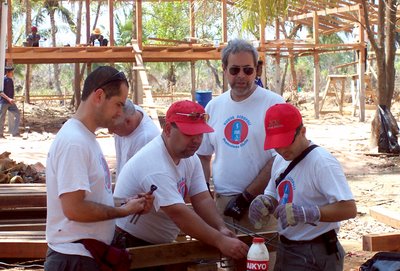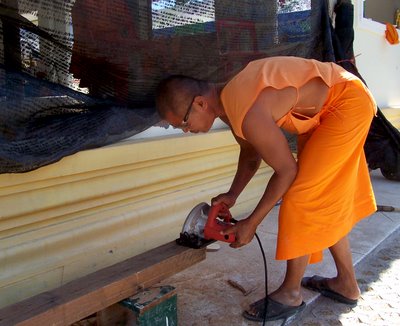Tsunami Recovery in Thailand | Part 10: FRUSTRATION OVER AID
(Part 10 of a 12 part series)
Five weeks after the Tsunami hit, Sishir Chang went to Thailand to see how the people there were recovering and to see how those concerned could help. The following is the tenth installment of his experiences in the aftermath of one of the world'’s most devastating natural disasters. Originally published in the Southasian, the article is being republished here, with previously unpublished photographs, with the author's permission.
___
Part 10: FRUSTRATION OVER AID
Italian volunteers from the organization New Acropolis
One of the most frequent complaints I heard about was the slow and frustrating pace of aid. There’s been such a huge outpouring of aid yet many average Thais don’t feel that much of that has gotten down to them. Many people coming out to help also feel frustrated by the bureaucracy and pace of aid. All of the aid workers that I’d spoken to had bypassed the major relief agencies and governments to come and deliver aid or volunteer themselves.
At Khao Lak one resort had set up its own tsunami volunteer aid center staffed by people who had showed up on their own to help. According to the aid center’s spokesperson Sophie Konnaris, all of them are volunteers who have come on their own money and time with very few having training or experience in dealing with disasters. In other cases individual towns in western countries have raised money to send volunteers. Duane Reid and George Thomson, volunteer paramedics, were sponsored by their hometown of Emerald, Queensland in Australia to come and help. While the town of Inverell in New South Wales, Australia had adopted the village of Bang Niang. There Rosemay Breen and Anna Thivakon brought with them aid and resources to help rebuild the village that had been wiped out by the tsunami. In a true example of ad hoc aid they enlisted a group of Italians from the organization Nuovo Akropoli (New Acropolis) who had showed up on their own accord at one of the refugee camps to see where they could help out. There they met Rosemary and Anna who quickly put them to work on rebuilding houses in Bang Niang.
A Khao Lak resort turned impromptu aid center
Frequent visitors and tourists to Phuket have also been bringing aid apart from official channels. I met the Grimm family in Kamala where the mixed Australian and German family had been having reunions for years. They had planned this year’s reunion well in advance of the tsunami but had had some trepidation about whether to come after the tsunami. As one member of the family put it, “Some of our friends thought it was disgusting to see people sunbathing where people had died.” After emailing people they knew in Thailand who told them to come they went ahead. For them this trip has turned into more of an aid mission than a vacation because they brought with them funds they had raised at home to distribute to people they knew in Kamala. Many of these funds were raised from people who lived in their home countries but who they had met in Kamala. On the day I met them they were there to see if the locals they knew had survived the tsunami. Unfortunately the resort they usually stayed at had been damaged by the tsunami and they had to stay at another beach.
Rebuilding the temple in Kamala
Other examples of ad hoc aid coming to the region was in the rebuilding of the temple and school in Kamala by the Grand Lodge of Western Australia and the Thai Rotary Club. Also in Kamala the Thai Rotary Club is helping fishermen get new boats. Sia, a Kamala resident, had owned four houses and a restaurant and laundry business with her family, which had been destroyed along with her sister and niece killed. She has since started reconstruction with aid donated by old customers from Europe. While I ate lunch in her makeshift restaurant she proudly showed off the construction work being done and pictures of the German who donated the money to buy the concrete. According to Sia it doesn’t do much good to give money to the Thai government or major aid groups but its better to bring it directly to the people.





No comments:
Post a Comment